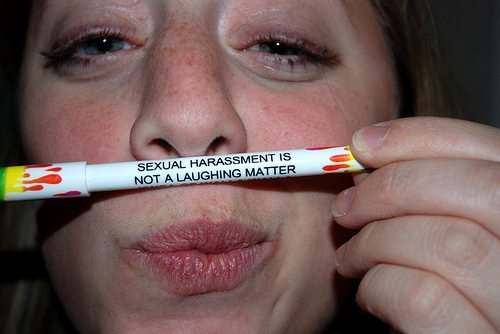STOKING FIRE: Hey Shorty! Combatting Sexual Harassment
People who are regularly subjected to harassment-–most, but not all of them female--report increased stress, anxiety, depression, and low self-esteem.

Joanne N. Smith, founder and executive director of Girls for Gender Equity [GGE], a 10-year-old Brooklyn, New York-based group that fights sexism by promoting the physical, psychological, social, and economic well-being of young people, is presently focusing most of her efforts on the devastating impact of sexual harassment. Whatever form the hectoring takes—GGE defines sexual harassment to include leering, touching, taunting, and gossiping as well as rape and physical battering—the adverse impact of sustained victimization on mental health, Smith says, is always the same.
Studies bear this out. One survey conducted by Indiana University found that people who are regularly subjected to harassment-–most, but not all of them female—report increased stress, anxiety, depression, and low self-esteem. Many also confide that they are tormented by feelings of shame. In the worst cases, respondents say that their ability to concentrate is diminished and admit that they have contemplated suicide.
“Feeling powerless contributes to young people making unhealthy choices about their bodies, GGE’s Joanne Smith continues. “The more disempowered you feel, the more likely you are to keep quiet about abuse. If you later drop out of school, you’re more likely to get pregnant if you’re a girl or go to prison if you’re a boy. Learning to speak up, to say ‘STOP,’ lends itself to getting out of bad relationships and teaches you to follow your gut. It gives you the confidence not to go to that party or get into that car.”
In other words, children and teens who are subjected to emotional or physical abuse are adversely affected socially, intellectually, and emotionally. This, of course, would be horrific even if it affected only a small number of youth, but reality is far harsher. A 2006 report issued by the American Association of University Women found that 83 percent of students who were queried—yes, more than four out of five–reported having been sexually harassed. For some, it was a stranger screaming “Yo, Mami“ at her as she walked down the street; for others, the behavior was more menacing and ranged from being called a bitch, slut, or whore, to being badgered to go out on a date, to being violently assaulted.
What makes this especially maddening is that the law already categorizes most of these behaviors as illegal. As for sexual harassment in public schools, take note: It’s been unlawful for 39 years, since Title IX [of the Education Amendments of 1972] was initially promulgated. The rule is straightforward: “No person in the U.S. shall, on the basis of sex, be excluded from participation in, be denied the benefit of, or be subjected to discrimination under any educational program or activity receiving federal financial assistance.”
If only Title IX were heeded. While every public elementary, junior, and senior high school is mandated to have a Title IX coordinator to train staff and students in the rule’s requirements; serve as a liaison between staff, students, and parents; and handle harassment complaints when someone comes forward, GGE knows that this rarely, if ever, happens. Their response was the creation of HEY SHORTY! A Guide to Combating Sexual Harassment and Violence in Schools and On the Streets. [co-authored by Smith, Mandy Van Deven, and Meghan Huppuch and released in April by The Feminist Press.] The book is an easy-to-read handbook, a how-to for assessing the problem and organizing to stop it.
It’s also a renewed effort to get people talking about something that is so common it’s seen as normal. This message—and the subsequent conclusion that “boys-will-be boys,” unable to rein in their impulses—should be of interest to everyone who associates with young people. And it has been—to a point. In fact, many feminist and youth organizations have leapt at the chance to learn more about enforcing Title IX and empowering young women to fight name-calling, pestering, and violence.
But the right wing? Perhaps predictably, abstinence and right-leaning groups have been Missing-in-Action in discussions on the subject. If you take a gander at the Abstinence Clearinghouse website, for example, and initiate a search on sexual harassment, you’ll be led to articles on “traditional” marriage and ending sexual addictions or an addiction to porn. As for sexual harassment itself, there’s nada.
Other right-wing sites including Wendy Shalit’s blog, modestlyyours.net, turn the tables and instead of blaming the harasser, blame the victim. “Low self-esteem and disrespect from men are natural consequence of promotion of sexual promiscuity,” she drones. ”Sexual promiscuity ruins lives. Modesty is the answer.”
Were that it were so simple. Lower hemlines and covered collarbones and elbows notwithstanding, sexual harassment has little to do with modesty and if Shalit and her colleagues truly want to reduce teen pregnancy they’ll follow GGE’s lead and work to empower girls to stand up to bullies. They’ll also help them stay in school since female dropouts tend to get pregnant earlier than those who graduate.
“Promoting abstinence gives adults an excuse to ignore their responsibility in creating a world that is safe for a variety of sexualities and sexual expressions,” says Hey Shorty! co-author Mandy Van Deven. “Most school staff don’t know how to talk about these things.” To rectify this, she calls on teachers and school administrators to learn about “the breadth of what harassment is, from gender-based to LGBTQ harassment, to how technology has become a harassment tool.” Lastly, she calls on the federal government to reinvigorate Title IX and sexual assault prevention.
Arne Duncan, are you listening?
